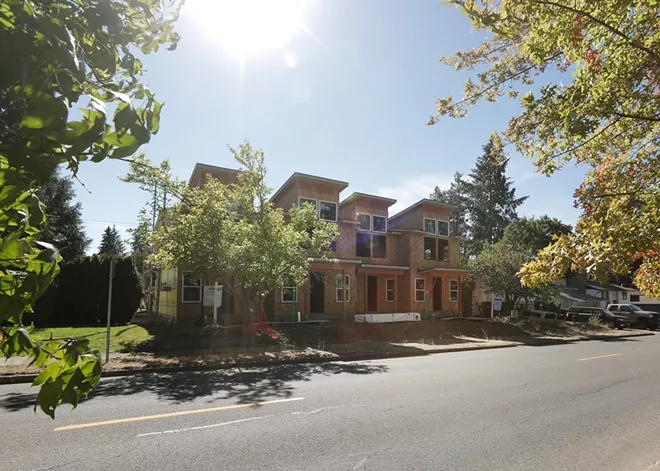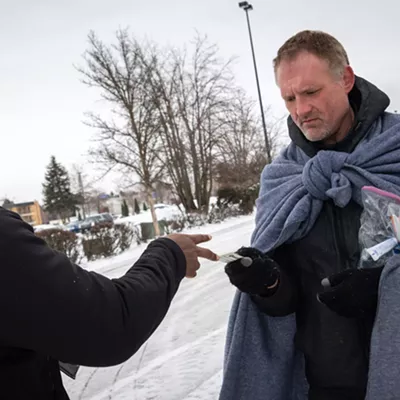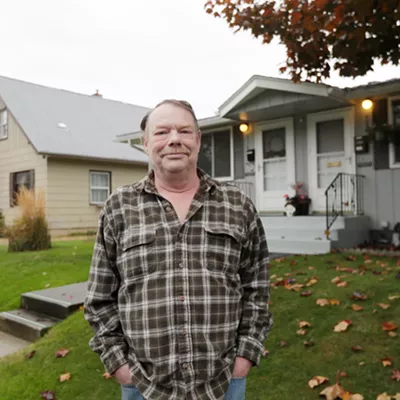
In August, more than 30,000 Democrats who support making it easier to build housing gathered online for a "YIMBYs For Harris" Zoom fundraising call.
YIMBY stands for "yes in my backyard" — a political movement that supports addressing the housing crisis by easing zoning regulations and encouraging development. The Zoom call, scheduled shortly after Kamala Harris announced her ambitious housing agenda, featured dozens of pro-housing Democratic elected officials from across the country. Attendees jokingly referred to it as "YIMBYchella," a sort of policy wonk version of the California music festival.
There was one city that had more elected officials on the lineup than any other in the country: Spokane.
"We are big YIMBYs and pro-housing," Spokane City Council member Zack Zappone told the Zoom group. "In this last year, we have completely eliminated single-family zoning in our city citywide. This summer, we completely eliminated costly parking mandates."
Zappone spoke at the event alongside City Council members Kitty Klitzke and Paul Dillon. Spokane Mayor Lisa Brown was also scheduled to speak, but had to miss the call because of a last-minute scheduling conflict.
"We are the second biggest city in the state, but — sorry Seattle — we are number one in terms of pro-housing policy," Dillon told the group. "Not that it's a competition, but it kind of is."
(Seattle, one of the bluest cities in America, had zero elected officials speaking at the event.)
As the Spokane politicians spoke, attendees spammed the live chat with supportive messages and "Ws," short for "win." They described Spokane as "ON FIRE" and "based" and "leading the way in Washington."
"Spokane is GOATED when it comes to YIMBY reforms," wrote Daniel Volland, a member of the Anchorage Assembly, the Alaska city's governing body. (GOAT is slang for "greatest of all time.")
In recent years, Spokane has gained a reputation as a pro-housing leader. The city's zoning policies continue to receive attention not just across the state, but even from other parts of the country. While many cities are only now starting to explore the idea of ending single family zoning, Spokane is way ahead of the curve.
Spokane is "jumping ahead of us, it's a sharp contrast," says Ron Davis, an urbanist advocate in Seattle. "You didn't wait for the problem to get as bad as us and now you're doing the things that we need to be doing."
NOT POLITICAL
Progressives like the ones on the Harris fundraiser call are sometimes YIMBYs, but that doesn't mean YIMBYism is an inherently left-wing ideology. The movement has supporters across the political spectrum. In some ways, its focus on removing government regulations and encouraging free market development is more closely aligned with libertarianism.
Spokane's City Council has a five-person liberal majority, but two of its members are conservatives who have run for other elected positions as Republicans — something that would be unthinkable in a place like Seattle.
The two conservatives — City Council members Michael Cathcart and Jonathan Bingle — frequently disagree with their progressive colleagues on issues like homelessness, public safety and taxes. But when it comes to housing? There's often an astonishing level of agreement and cooperation.
"It crosses party lines on both ends," Cathcart says. "You've got people who don't want growth at all in both parties, and you've got folks who understand property rights and markets and our desperate need for housing" on both sides.
Spokane's zoning reforms had support from both conservative-aligned home builder organizations and left-leaning homeless advocacy groups. Mayor Brown thinks bipartisanship is a key element of Spokane's housing progress.
"We clearly have different ideological perspectives in the city, but this is an area in which people have come together," Brown says.
Cathcart likely wouldn't be caught dead at a Harris fundraiser, but he supports many of the zoning policies his progressive colleagues bragged about on the Zoom call. While he doesn't like using labels like "YIMBY" to describe himself, Cathcart was a key figure in Spokane's push to end single family zoning citywide in 2022.
"Not to toot my own horn, but go back and watch the housing action plan discussion three years ago," Cathcart says. "You would hear me say 'Housing crisis, housing crisis, housing crisis.'"
BOCA
In 2021, Spokane was facing a dire housing affordability crisis. As the pandemic supercharged remote work, Spokane's population boomed. Rents and housing prices skyrocketed.
It was around that time that former Mayor Nadine Woodward, a conservative, hired Spencer Gardner to lead the city's planning department. Gardner, who wrote for the pro-housing planning website Strong Towns, worked with city leaders to craft a law called "Building Opportunities and Choices for All," or BOCA, which dramatically opened up the city's zoning policies to allow dense housing development citywide.
That meant developers could suddenly build duplexes, triplexes, fourplexes and townhomes — often known as the "missing middle" — in all residential parts of the city. The goal: more houses, lower costs. Cathcart likes to describe it as "legalizing Kendall Yards-style development."
"By legalizing that citywide, we created opportunities for significant home ownership all across the city," Cathcart says. "I think that is something that was incredibly unique and, frankly, more advanced than what most of the country is even contemplating."
The City Council passed BOCA as an interim zoning ordinance. That allowed the city to bypass the types of organized opposition campaigns that often appear when leaders contemplate increasing neighborhood density. The city alleviated peoples' concerns by noting that the council could get rid of the law if it wasn't working out in a year.
BOCA caught people's attention. The work was recognized by the American Planning Association, and Washington Gov. Jay Inslee described it as "incredibly visionary," praising Spokane for being bolder than other Washington cities while presenting the city with a "smart communities award" earlier this year.
"We've had some local leaders who haven't been willing to stand up to take these measures, and to those leaders, I want to show them what Spokane is capable of," Inslee said.
Part of the credit for Spokane's growing reputation as a housing leader goes to Anthony Gill, who runs the blog Spokane Rising and now writes columns for the Inlander. He's been a big booster of Spokane's housing success and has sung the city's praises on a number of urbanist blogs and podcasts.
"By necessity, I think that people have to come together in a place like Spokane, where they might not have to in a place like Seattle or San Francisco," Gill said on a recent episode of the California YIMBY podcast. "We're kind of a blue dot in a sea of red... people are comfortable having strange bedfellows."
City Council member Dillon says there's a sense of "unity and cohesion" that goes beyond partisan politics when it comes to housing access for all in Spokane. He says the city's planning and development departments deserve a lot of credit for the recent progress.
"I think we've tried to foster an environment where planners can really excel," Dillon says.

GOOD BONES
Davis, the Seattle housing advocate, wonders if the sudden speed and intensity of Spokane's housing crisis was also a factor in its aggressive approach to zoning reform.
Seattle has been dealing with a housing affordability crisis for a very long time. That's given groups who are opposed to density lots of time to get entrenched and organize against development, he says.
"In some ways we've got these sort of legacy problems to overcome," Davis says.
Spokane, however, was affordable up until recently. Young people could grow up here and expect to own a home. When Spokane's housing crisis hit hard and fast in the early 2020s, Davis thinks it spurred leaders to act quickly — to "really show up in an acute way and basically say, 'Wow, there's a problem, let's fix it.'" (Davis ran for Seattle City Council last year and lost to an opponent who took a more moderate stance on density and upzoning.)
Brown, who took office in January, thinks Spokane has the "bones of a really great city" that lends itself well to urban planning. Much of Spokane is built on a pre-war grid system that complements missing middle development like duplexes and fourplexes.
"We have these close-in, urban neighborhoods with small business districts that are part of them," Brown says. "And so these policy moves that were made kind of build on what's already a strength of the city."
Brown notes that Spokane also has strong park, library and school district systems that work well together and complement urban design. The city has a "very evolved" neighborhood council system that allows people to take a more direct role in improving traffic and other quality of life issues in the neighborhood, she says.
PARKING AND BEYOND
In 2023, the state Legislature passed a law similar to Spokane's new zoning law that requires Washington cities to allow missing middle housing in all residential neighborhoods. State Rep. Marcus Riccelli, a sponsor of the bill, says the city of Spokane's zoning reform was a "catalyst" for the statewide bill that showed there is a "path forward."
"I think Spokane was a beacon to help push that over the finish line," Riccelli says.
While many cities are now working to update codes to comply with the statewide law (sometimes with resistance), Spokane is already there. After the one-year BOCA pilot ended, the City Council passed a permanent version of the law that went even further — expanding it to allow up to a sixplex on any residential lot.
Of course, there are some critics of Spokane's zoning reforms. Neighbors in some of the city's outlying areas are worried about rapid growth without proper infrastructure in place, and some have expressed concerns about traffic increases and protecting natural areas.
But proponents of the law note that new units permitted under BOCA have been mostly spread evenly across the city, and that no single neighborhood has been dramatically disrupted.
"I think it comes down to a combination of smart growth and essentially letting markets and property rights play a significant role in this overall process," Cathcart says. "Obviously things don't change overnight, but that has slowly created a lot more opportunities, in particular for home ownership."
Spokane has taken a similar approach to abolishing parking mandates, which previously set a minimum number of parking spaces that developers had to build when constructing new housing. As with single family zoning, urbanists have long argued that the requirement makes it prohibitively expensive to build new housing and creates car dependency.
In 2023, progressive Council member Zappone worked with conservative Council member Bingle to abolish parking mandates within half a mile of public transit stops. This summer, the City Council went further and abolished parking mandates citywide, making Spokane the largest city in Washington — and the 12th largest in the country — to do so.
"This is an example of the council repealing government regulation, which is an exciting opportunity," Zappone said on the night of the vote.
Council member Cathcart was the sole "no" vote on abolishing parking minimums. He says he had specific concerns about parking problems in the Logan neighborhood that he wanted to address before moving forward. Still, he's open to the idea in principle.
"I think we have to get some of those issues under control before we take those big steps, but we've taken them, and we'll see where things go," Cathcart says. "I'm not opposed to letting the market decide on parking."
Dillon notes that the City Council has recently pushed the state government to move faster on incentives for converting downtown commercial spaces to residential. Developers and city planning staff are eager to move forward, he says. Over the past year, the City Council has also shown a strong interest in bike and pedestrian infrastructure and a willingness to engage with safe streets activists.
Brown says there's a lot more work to do to improve housing and livability in Spokane.
"We still have too many surface parking lots," Brown says. "We've got lots more potential for downtown." ♦

























